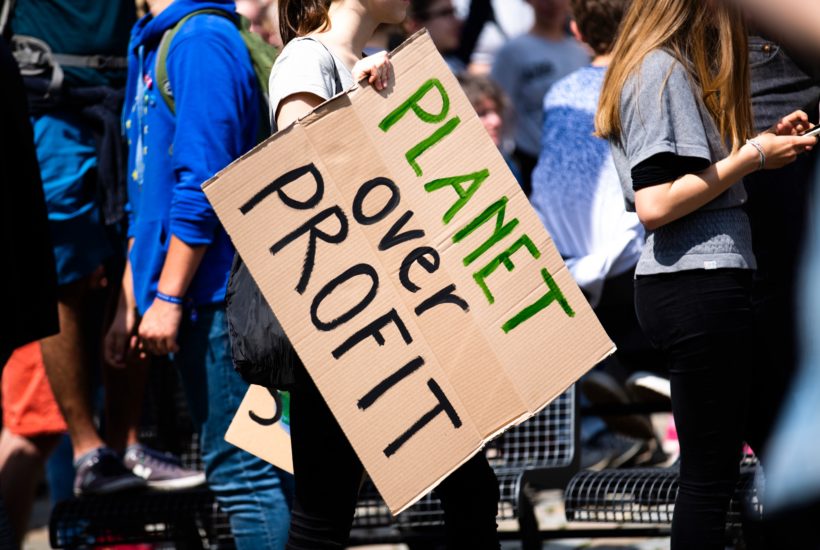Featured
Many ESG and Climate Funds with Greenwashing Problem, Study Says
How green are ESG and climate funds really? A study has examined whether the funds in this asset class, which is worth billions, are guided in their selection by the Paris climate goal and how many are merely marketing and also have shares in particularly climate-damaging sectors in their portfolios. Of the 723 broad ESG funds examined, 421 or 71 percent are not in line with the climate targets.

ESG and climate funds have risen from a niche topic to the hottest asset class in just a few years. The total value of these funds is already $1.7 trillion. However, anyone who wants to invest in an ecologically correct fund with a clear conscience must ask themselves whether they are really only investing their money in companies that do not invest in “dirty” industries with high CO2 emissions. For a layman, this is difficult to determine. With the strong growth, there is also growing concerned among regulators about the quality, consistency, and transparency of the products available.
That’s why UK think tank InfluenceMap took a close look at 723 equity funds promoted as ESG and climate funds. Their fund volume is already $330 billion. They checked to see if their choice of securities was guided by Paris climate targets, to which 195 countries have committed and set as a goal to reduce global warming to below two degrees Celsius. Special attention was paid in the climate compatibility check of the funds to the question of whether they have securities in their portfolios that run counter to this intention.
Read more about the study on ESG funds conducted by the British company InfluenceMap and find the latest business news with the Born2Invets mobile app.
Eight “dirty” sectors
The analysis was conducted using the Paris Agreement Capital Transition Assessment (PACTA) methodology. This was developed by the non-profit think tank 2-Degrees Investing Initiative to examine the climate impact of investment portfolios. InfluenceMap analysts used this data to determine whether and how many funds included shares of climate-relevant sectors – which account for 70 to 90 percent of CO2 emissions financed by capital markets. The “dirty” industries include oil and gas production, coal mining, transportation (automotive, aviation, shipping) and industry (steel, cement). They are particularly relevant to achieving climate targets. Corporations that emit more greenhouse gases on average than allowed under the Paris Agreement to meet climate targets.
The result of the study by the British think tank: of the 723 broad ESG funds examined, 421 or 71 percent are not in line with the climate targets and have shares of particularly climate-damaging companies from the eight sectors mentioned in custody. For example, they hold shares in oil companies such as Total, Halliburton, Chevron and Exxon Mobil.
Climate funds invest in a climate-damaging way
The eco-check for climate funds is not much better. Of 130 climate funds, 72 (55 percent) received a negative rating. The funds crystallized according to PACTA method as not compatible with the climate goals. For example, the funds studied that carry the climate funds marketing label invest $153 million of their portfolios in stocks of companies in the fossil fuel value chain. Such holdings may be of concern to investors, especially in the wake of the IEA’s Net Zero by 2050 report, which recommends an immediate halt to all new fossil fuel exploration.
However, according to study authors, the problem begins with climate-related stock indexes, which also feature shares of companies that are particularly harmful to the climate. Most of these funds follow a passive strategy, attempting to track market indexes while applying exclusion and/or weighting criteria. These strategies result in portfolios that are either only slightly different from the underlying benchmark or identical if some fossil fuel companies are excluded. The remaining holdings of these funds are then similarly misaligned with the tracked market index.
According to InfluenceMap, the results of the research show the lack of consistency and, in many cases, transparency in the direction of many ESG and climate funds and the selection criteria of stocks pushing global climate goals. Investors are well advised, in view of such apparently massive greenwashing, to take a close look at the fund factsheet before buying and at least check the stated stock position for particularly climate-damaging investments, as long as the marketing and transparency of climate and ESG funds are not subject to stricter requirements.
__
(Featured image by Markus Spiske via Unsplash)
DISCLAIMER: This article was written by a third party contributor and does not reflect the opinion of Born2Invest, its management, staff or its associates. Please review our disclaimer for more information.
This article may include forward-looking statements. These forward-looking statements generally are identified by the words “believe,” “project,” “estimate,” “become,” “plan,” “will,” and similar expressions. These forward-looking statements involve known and unknown risks as well as uncertainties, including those discussed in the following cautionary statements and elsewhere in this article and on this site. Although the Company may believe that its expectations are based on reasonable assumptions, the actual results that the Company may achieve may differ materially from any forward-looking statements, which reflect the opinions of the management of the Company only as of the date hereof. Additionally, please make sure to read these important disclosures.
First published in trend., a third-party contributor translated and adapted the article from the original. In case of discrepancy, the original will prevail.
Although we made reasonable efforts to provide accurate translations, some parts may be incorrect. Born2Invest assumes no responsibility for errors, omissions or ambiguities in the translations provided on this website. Any person or entity relying on translated content does so at their own risk. Born2Invest is not responsible for losses caused by such reliance on the accuracy or reliability of translated information. If you wish to report an error or inaccuracy in the translation, we encourage you to contact us.

-

 Impact Investing5 days ago
Impact Investing5 days agoThe Sustainability Revolution: Driving a Net-Zero, Nature-Positive Economy
-

 Biotech2 weeks ago
Biotech2 weeks agoNew Molecular Clues Explain Aggressive Neuroblastoma and Point to Targeted Treatments
-

 Business3 days ago
Business3 days agoTopRanked.io Weekly Affiliate Digest: What’s Hot in Affiliate Marketing [EKSA Affiliate Program Review]
-

 Fintech1 week ago
Fintech1 week agoSwissHacks 2026 to Launch Inaugural Swiss FinTech Week in Zurich
























